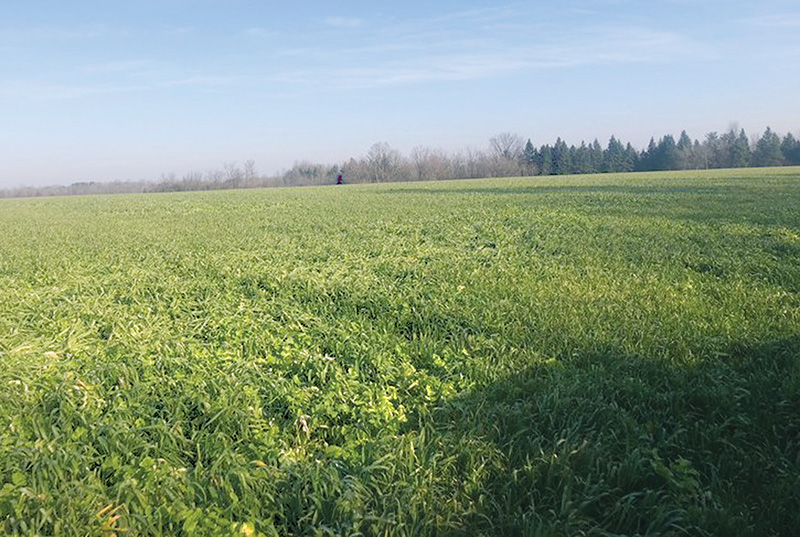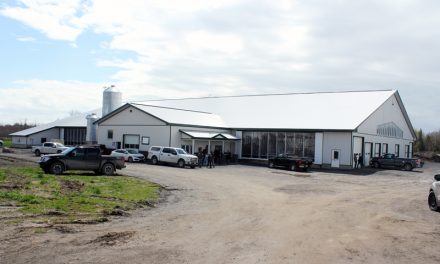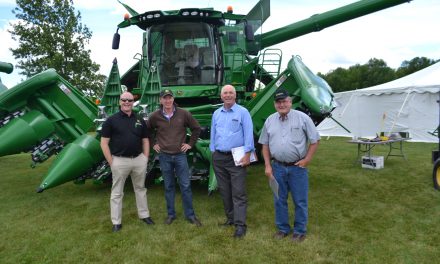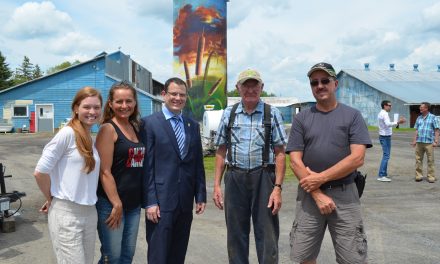This cover crop is made up of oats, forage peas and radish. Courtesy Photo
ST. ISIDORE – A lifetime has passed since Chantal and Marc Bercier started farming in St-Isidore, Ontario. During that time, the couple has created family businesses called Centre de Criblage Marc Bercier Inc. also known as CCMB and their cash crop farm Ferme Agriber Inc. They have for several years now, teamed up with their son Guillaume and his wife Karine.
The vision of their businesses is around sustainability and surrounds the belief that farmers need to always think of ways to regenerate their soil in order to retain its ability to nourish whatever crop that is on it.
CCMB’s philosophy is simple. They believe that farmers should be paying more attention to the health of the soil they depend on, and cover crops are one way to do that. Consequently, CCMB has become a leading provider of cover crop seeds in Eastern Ontario. Cover crops are designed to nourish the soil they are planted in, putting much needed nutrients back into the soil that are then used by other money-making crops like soybeans and corn. They are plants that either slow erosion, improve soil health, help with pest, weeds, and disease control, enhance water availability, and various other benefits to the farm management.
To CCMB, sustainability is not just a nice environmental idea but rather is a very real goal farmers including themselves strive for in the age of modern farming. The core philosophy of their company is to improve the health of soil that farmers depend on in a sustainable way.
“In the perception of the public, we hope to be seen as an organization that will be a leader in seed production and in providing great quality seeds locally. We are farmers serving farmers,” said Bercier. “We support research on the farm.” We also strive to provide all types of cover crops to our local market, and we are able to do so with the help of Semican Inc. It wouldn’t be possible to have access to all types of seed without their support.
CCMB and Marc’s interest in cover crops began almost 15 years ago. “I purchased some farmland and noticed some of it was not the best quality. We discovered throughout the years that if you want to take care of your crop you have to take care of your soil structure.” He realized that the first step in making farmers more aware of the importance of cover crops was education. CCMB then began to educate farmers in his area.
Cover crops do the job of putting back into the soil nutrients that are taken out by regular crops. They are relatively inexpensive compared to the cost of planting a commercial crop of soybeans for example. The cover crops once they degrade back into the soil, increase soil fertility and structure. As the cost of fertilizer goes up, cover crops are an effective alternative.
Bercier said, “As farmers planted more soybean and corn crops for example and less cereals and hay, we could see very quickly a deterioration of the soil structure. About eight years ago, we tried out all the different cover crops. We had over 30 different cover crop mixes, to see which one did the most for the soil structure and at what cost.”
With the advent of more efficient spreading machines, Bercier said cover crop application became easier. One of the challenges in using a cover crop to enhance the health of the soil was having the right equipment to plant it. “We had to find out how a large cash cropper who did not have the equipment to do the seeding could introduce that without major investments in equipment. A cover crop is a long-term investment,” said Bercier.
No matter the objective of cover crops, the farmer needs to think that the investment will be beneficial on a long-term basis. CCMB encourages all farms to consider such practices and to exchange with agronomic specialists to determine exactly what kind of cover crops would be beneficial on their farm. A healthy soil with good structure provides better yields with money making crops and a decrease in cost of inputs. This is particularly important this year and potentially in future years, considering the cost of fertilizer!
For more information or to contact CCMB you can call 613-524-2981 or email Karine Bercier at kbercier@marcbercier.com. They are located at 251 B Caledonia Road, St-Isidore, Ont. K0C 2B0.













